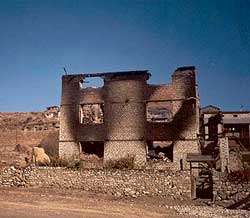 It's hard not to feel elated about the chances for peace, or at least a long drawn out session of jaw-jaw, not war-war. And for once, I'm not going to look for worms in the pudding. If they're lurking, they'll poke their heads up soon enough. Instead, a few thoughts from the hinterland where so few of our Kathmandu folk dare to tread.
It's hard not to feel elated about the chances for peace, or at least a long drawn out session of jaw-jaw, not war-war. And for once, I'm not going to look for worms in the pudding. If they're lurking, they'll poke their heads up soon enough. Instead, a few thoughts from the hinterland where so few of our Kathmandu folk dare to tread. There can be no exaggerating the sense of urgency. No chardonnay-sipping party-goer in the capital can imagine how bad it is out there. And where is "there"? It's everywhere, people, everywhere. I've just come from Jumla, scene of the last and worst major Maoist attack. Just in case anyone in Kathmandu has forgotten, and it certainly seems to the Jumli's that they have, this was a town devastated by violence. It remains that way, despite distant talk of ceasefires, bargaining committees and the sanctity of certain bargaining positions.
Perhaps a good start for both negotiating teams in the upcoming peace talks would be a tour of the hardest hit areas of Nepal, and we could start with Jumla. Arrive by air and the destruction greets you. The airport control tower and the living quarters of the staff lie in blackened ruins. So do 40 other buildings in this valley forsaken by the gods on at least one night last November.
Many of the blown-up and gutted houses belonged to ordinary local people. Their crime was having a sign on the front of their home. To the Maoists who stormed Jumla, such signboards, whether for local NGO's, a Canadian aid project or a privately owned printing press, were a magnet. Apparently they assumed that such signs meant government offices. But it was largely ordinary people and those trying to help them who were hit. And you know what? No one's done a damn thing for those ordinary victims since that night. Not the government, not the aid world, not we journalists, not anyone.
So the negotiators gets the quick tour of Jumla and if the return flight is delayed due to fog, perhaps they could all spend the night. The cold and the curfew, the fear of night and the desparate hope at sunrise, the bleak feeling that no one is paying attention, all these might add some urgency to proceedings. But let's assume that Yeti Airways manages to find seats for the bargainers, or Shangri La, or even RNAC. I'd suggest a talk with the pilots of any of those airlines as the Twin Otter crests the passes between high points in the middle hills. You'll hear some tales from them-of the wrecked and dangerous airfields where they've flown in food, the mass public gatherings that could not have been staged or held through coercion, and the looks in the eyes of passengers coming in and out of remote destinations. Our negotiators might even talk to their fellow passengers.
Probably we'd touch next at Nepalganj, town of smugglers, mosques and brass work markets-now the heart of civil war. Why not wander over to Bheri Zonal Hospital where Dr Durga Pradhan keeps watch on a trauma ward for civilians caught in crossfire or damaged by savagery on both sides. Check with beleaguered human rights activists who thought they were only trying to help, but ended up as enemies of the state, or targets of the revolution. Ask the teachers from private schools west of the Karnali queuing up to get passports at the CDO's office why they're leaving the country, despite news of the ceasefire.
There are so many other places that I'd like the peace negotiators to visit. The villages of Bajura where hunger is a growing threat, not starvation, just long, malnutrition-fueled economic decline. Humla, where innovative development and political enlightenment have been sabotaged by war and rebel intransigence. Rukum and Rolpa to hear what the heartland of the revolution thinks. And just about every other part of this country that's been either ignored or misinterpreted by national figures from all sides in this war.
The ceasefire provides immense opportunity for innovative thinking and inclusive behaviour. And a good place to start is with the men (where are the women?) who have the fate of the nation in their hands. Think of it as "Destination Nepal 2003".



